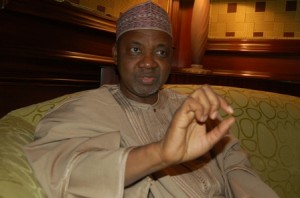Rehabilitation of 4000km Rail Lines Near Completion- VP Sambo
The Federal Government is working hard to complete the rehabilitation of 4000km rail lines across the country. This was made known by Vice-President Mohammed Namadi Sambo in Lagos during a lecture presentation at the quarterly business luncheon of the Island Club.
In his lecture titled “‘Nigeria’s Economic Potentials: Incentives for Growth of the Real Sector,” the Vice president confirmed that the Kano (western) corridor would be completed this year and the Port-Harcourt-Maiduguri (eastern) corridor would be completed by the end of next year.
Sambo also confirmed the award of contract for the construction of the Lagos-Ibadan segment while the Abuja-Kaduna segment of the central corridor (Kaduna-Warri) standard gauge rail lines is in progress.
“Consultancy service works for development of the east-west railway line and other corridors are in progress. The Itakpe-Ajaokuta-Warri standard gauge rail line is nearing completion with the entire track completely laid. On the rolling stock, 25 new General Electric locomotives have been procured.”
“In order to enhance sustainability and durability in the rail sector, we have signed a Memorandum of Understanding with General Electric to establish a locomotive assembly plant and maintenance facilities in the country,” he added.
The Vice President stressed that the Federal Government was determined to complete all inter-regional high ways in the country under construction as soon as possible.
“These include the Abuja-Lokoja, Ogbomosho-Ilorin, East-West road from Benin to Calabar and Kano to Maiduguri. Government is also addressing the problems of Lagos-Ibadan expressway in the interest of the people and economy of the country.”
“These road projects cover about 2000km across the country. Several bridges are being constructed or are at advanced stage of planned development, including the second Niger Bridge connecting the East and West of the country; and the Oweto Bridge across River Benue, etc,” he explained.
Sambo reiterated the importance of the deregulation of the petroleum industry, that it would encourage development in the Nigerian Economy.
In his words, “We are all aware that the Petroleum Industry Bill (PIB), a comprehensive piece of legislation that will turn around the oil and gas industry in Nigeria has been approved by the Federal Executive Council and sent to the National Assembly.”
He explained that the present administration amended the PIB to guarantee transparency and accountability. It was also intended to meet the targets of all stakeholders, following the realities on ground as well as the trend of global energy.
“The government is also pursuing its stated objectives of reducing gas flaring, through the encouragement of accelerated gas development projects. I am glad to say that between 2011 and May 2012, gas flaring has reduced from 24 per cent to 18 per cent.”
“Capacity utilisation by existing domestic refineries has greatly improved, from 30 per cent to 60 per cent. The phased plan of returning refineries to 90 per cent capacity has commenced with the ongoing rehabilitation of the Port Harcourt refinery to be followed by Warri and Kaduna refineries,” he stated.
He informed that, the government’s top priority is to boost inflow of foreign direct investments and the government is working tirelessly with all its agencies to realise the set goals.









